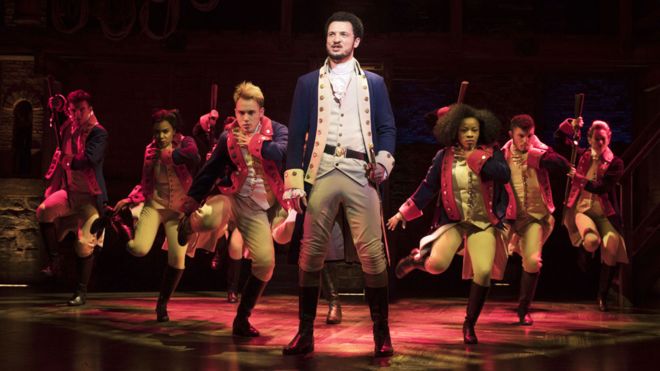I first became aware of the Broadway show Hamilton when we visited family in the US in 2016. I was told that if (when!) this came to London I should beg, steal or borrow tickets because it was sensational. Yes, I said, politely, thinking that a show about the Founding Fathers of America probably would not do as well in the UK. It has. And it is. Sensational.
 My youngest daughter, a keen singer, started getting into the show a year or so ago. She has been listening to and singing along to the soundtrack almost continuously ever since. When it was her birthday earlier this year I decided to get her tickets. I was astonished to discover how difficult these were to obtain (and how expensive!), so she has been waiting patiently for almost six months to enjoy her birthday gift. Last week, during half term, we travelled to London to see the show. It was worth the wait and she promptly declared that it was the best experience of her life. For me, seeing her enjoying something so much and how she has engaged so wholeheartedly with the story, the music and the ethos of the production, has the been the greatest pleasure.
My youngest daughter, a keen singer, started getting into the show a year or so ago. She has been listening to and singing along to the soundtrack almost continuously ever since. When it was her birthday earlier this year I decided to get her tickets. I was astonished to discover how difficult these were to obtain (and how expensive!), so she has been waiting patiently for almost six months to enjoy her birthday gift. Last week, during half term, we travelled to London to see the show. It was worth the wait and she promptly declared that it was the best experience of her life. For me, seeing her enjoying something so much and how she has engaged so wholeheartedly with the story, the music and the ethos of the production, has the been the greatest pleasure.
I’ve seen a few musicals over the years, and many of the biggest ones, but they would not normally be my first choice for theatre. I prefer drama. Also, I find that some of these productions, when they have had very long runs, can become tired. Hamilton has been at the Victoria Palace for over a year now and it certainly has not run out of steam. The show was a tour de force from the opening bars to the final curtain. I must also say that, knowing the songs as well as I do (they’ve been in my background for months!) added to my enjoyment.
I knew next to nothing about Alexander Hamilton the man. He was the brains behind the United States financial system, the first Treasury Secretary, influential in George Washington’s presidency and founder of the national bank. As an orphan who climbed his way to the top of politics, he embodies the American dream of self-made success. He was killed in a duel by his long-time rival Aaron Burr in his late forties. Quite a life.
As you may know, Hamilton has won many awards, including the Pulitzer Prize for Drama, mostly for its originality. The music of the show incorporates rap, hip-hop, R&B and soul, unusual for this type of production, and it is both refreshing and memorable. It is also well-known for its colour-conscious casting of non-white actors. Whilst none of the main protagonists in the story were actually people of colour, the aim was to draw attention to how black and non-white history is so often under-acknowledged and under-discussed. It seemed appropriate that we went to see the show during black history month which aims to redress that balance.
So, a stunning show that I enjoyed much more than I expected to. I now consider myself a fan and would definitely see it again. The energy of the show left both my daughter and I on a real high.
Have you seen Hamilton? If so, what did you think?
If you have enjoyed this post, I would love for you to follow my blog. Let’s also connect on social media.


 It is extraordinary to think that this remarkable novel, still as popular and as shocking today as ever, was written when Mary was just 19 years old. The fact that she was such a literary talent is not surprising given that she was the offspring of the two famous intellectuals, Mary Wollstonecraft, philosopher and author of the seminal feminist work A Vindication of the Rights of Woman, and William Godwin, the radical political philosopher. In her lifetime, she was highly regarded as a radical writer and intellectual, as well as being the wife of the poet Percy Bysshe Shelley, whom she met and fell passionately in love with at the age of 17. Her reputation since her death, however, has been overshadowed by that of her husband’s, with whom she bore four children (three died in infancy), whose affairs and financial troubles she endured, and whose poems she edited both before and after his death. Percy Bysshe Shelley drowned at sea in 1822, just six years into their marriage when she was 25. She died at the age of 53 in London from a suspected brain tumour.
It is extraordinary to think that this remarkable novel, still as popular and as shocking today as ever, was written when Mary was just 19 years old. The fact that she was such a literary talent is not surprising given that she was the offspring of the two famous intellectuals, Mary Wollstonecraft, philosopher and author of the seminal feminist work A Vindication of the Rights of Woman, and William Godwin, the radical political philosopher. In her lifetime, she was highly regarded as a radical writer and intellectual, as well as being the wife of the poet Percy Bysshe Shelley, whom she met and fell passionately in love with at the age of 17. Her reputation since her death, however, has been overshadowed by that of her husband’s, with whom she bore four children (three died in infancy), whose affairs and financial troubles she endured, and whose poems she edited both before and after his death. Percy Bysshe Shelley drowned at sea in 1822, just six years into their marriage when she was 25. She died at the age of 53 in London from a suspected brain tumour. By any standards her life was remarkable and in the last few years her reputation has been revived and she has begun to be more widely considered as a formidable talent in her own right, rather than just a ‘one-book author’. Frankenstein has been a staple of English literature GCSE and A level syllabuses for years, but most of her other works have fallen out of print. A new biography, In Search of Mary Shelley: The girl who wrote Frankenstein, by Fiona Sampson was published earlier this year, some of which I caught when it was serialised in Radio 4 recently. What I heard sounded fascinating. Sadly it is not available on the BBC iPlayer at the moment.
By any standards her life was remarkable and in the last few years her reputation has been revived and she has begun to be more widely considered as a formidable talent in her own right, rather than just a ‘one-book author’. Frankenstein has been a staple of English literature GCSE and A level syllabuses for years, but most of her other works have fallen out of print. A new biography, In Search of Mary Shelley: The girl who wrote Frankenstein, by Fiona Sampson was published earlier this year, some of which I caught when it was serialised in Radio 4 recently. What I heard sounded fascinating. Sadly it is not available on the BBC iPlayer at the moment.
